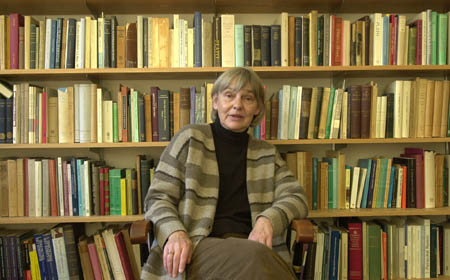A peripatetic returns:
After 3 years abroad, expert on ancient philosophers is back

Striker, who returned to Harvard this year after working for three years at the University of Cambridge, was, in the 1960s, planning to concentrate on the study of linguistics while a student at Gottingen University in her native Germany. One day, however, she walked into a philosophy lecture being delivered by the brother of a family friend.
The lecture piqued her interest and she soon became enamored with the works of the classical philosophers: Aristotle and Plato, and the generations of Stoics and Skeptics and others that followed.
“I started out thinking I would do linguistics, that I’d do a bunch of Romance languages,” Striker said. “I had avoided philosophy like the plague because I didn’t like Nietzsche.” After attending the lecture, she recalls, “I thought, ‘That’s what I want to do.’ But I couldn’t possibly have known this in advance.”
Today, Striker is happy to be back at Harvard, which she said feels like home after three years in England. She is teaching classes in the departments of Philosophy and the Classics, but admits last summer’s move back to the United States put a crimp in her research schedule.
“I thought I’d be working on Aristotelian logic this summer but moving and setting up house took a lot of time,” Striker said. “It was almost like coming home. After three years, I [still] knew almost all my colleagues and some of the students.”
Striker first taught at Harvard as a visiting professor in 1985. She was named a professor of classical philosophy at Harvard in 1989 and the George Martin Lane Professor of Philosophy and of the Classics in 1990. She left Harvard in 1997 to become the Laurence Professor of Ancient Philosophy at the University of Cambridge.
Striker is best known for her work on the epistemology and ethics of the Hellenistic schools – Epicureans, Stoics, and Skeptics of the third century B.C.E. For at least two centuries, the philosophers of these schools were involved in lively debates about the possibility of knowledge on the one hand, and about the best human life on the other. Stoic ethics in particular has had a profound influence on early Christian thought and many later theories of ethics.
Striker has published dozens of papers on the Stoics, Aristotle, and other ancient philosophers. She received a Walter Channing Cabot fellowship in 1995-96 from Harvard in recognition of her scholarly work.
“Reading a text slowly and talking about it as you go along, without the pressure of doing a bibliography and writing a paper, is a way of getting new ideas.”
Giselle Striker
Not surprising for a philosophy expert, Striker likes to debate and is good in argument, according to Philosophy Department Chair Christine Korsgaard, the Arthur Kingsley Porter Professor of Philosophy. Korsgaard, who first got to know Striker when Korsgaard came to Harvard in 1991, said they are glad to have her back from Cambridge.
“The department was overjoyed,” Korsgaard said. “I just want to say how delighted we are that she decided to come back.”
The department isn’t entirely the same as it was when Striker left, having added a new junior faculty member in classical philosophy, assistant professor Raphael Woolf. With a thousand years of philosophy to cover, Striker said, Woolf’s presence is a welcome one.
When asked about her teaching style, Striker gets a bit philosophical. She said she tries to get students to think about the situations these ancient philosophers were in.
“What I’m trying to do, and sometimes manage to do, is getting them to think hard about the problems these philosophers were thinking about,” Striker said. “If they get intrigued and start thinking about it themselves, they can start debating it on their own.”
Striker said she particularly enjoys reading groups that bring together graduate students from both philosophy and the classics. In those groups, she said, the students can exchange ideas and understand their subject matter from a different point of view.
A reading group on ancient philosophy helped her a lot when she began to study philosophy, she said, leading to her eventually writing her dissertation on Plato. Striker received her doctorate in philosophy from Gottingen University in 1969.
“Reading a text slowly and talking about it as you go along, without the pressure of doing a bibliography and writing a paper, is a way of getting new ideas,” Striker said.
Drawing on her own experiences, Striker said she tells students not to obsess about their eventual career paths. Particularly in the humanities, she said, a broad background will serve them well.
“That’s what I tell students, ‘Don’t feel you have to be on a single track.’” Striker said. “They tend to find this reassuring because they think, they believe, they have to decide what track they will be on at age 12.”
In the end, Striker believes faculty members learn as much, if not more, from students than the students learn from them. In preparing for each class, she said, the instructor has to absorb any new subject matter he or she hadn’t been familiar with before. For Striker, who said she tries never to present the same lecture twice, that means she learns a bit for each class._ “I usually hate my lecture notes from the last time,” Striker said. “You really do learn something every time, even if you teach the same class, because you can always vary [your lecture].
“I do think for many of us the motivation [to teach] is that you want to learn things, and this is a good way to do that,” Striker said.




